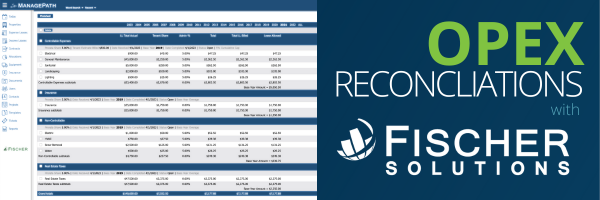OpEx Reconciliations in Commercial RE
Operational Expense (OpEx) reconciliations play a crucial role in managing costs and ensuring accurate financial reporting for commercial real estate. Finding a software solution, such as Fischer Solutions’ ManagePath, can take on the responsibility of reconciling efficiently.
OpEx reconciliation is the process of tracking, reviewing, and reconciling expenses incurred in the operation of a commercial property. It involves comparing and aligning the actual expenses incurred with the terms outlined in lease agreements, budget projections, and industry standards.
Effective OpEx reconciliations strategies for tenants are essential for optimizing operational efficiency and maintaining strong landlord-tenant relationships. In this blog, we will explore key strategies that can help commercial real estate professionals achieve successful OpEx reconciliations.

Understanding Tenant OpEx Reconciliations
Tenant OpEx reconciliations involve the careful review and analysis of operational expenses that are incurred. Subsequently, reconciling them with the expenses allocated by the landlord. It aims to ensure that the expenses charged to tenants are fair, accurate, and in compliance with lease agreements.
OpEx reconciliations encompass a wide range of operating expenses or common area maintenance (cam) costs incurred by the landlord and billed to the tenant, including but not limited to:
- utilities
- property taxes
- insurance
- maintenance and repairs
- property management fees
- janitor services
- landscaping
The goal of OpEx reconciliations is to ensure that these expenses are allocated and billed correctly to tenants. Thus, aligning with lease provisions and legal requirements.
Steps for Successful OpEx Reconciliations
The process typically involves the following steps:
- Data Collection: Gathering accurate and detailed expense data from various sources, such as invoices, receipts, vendor statements, and accounting records.
- Expense Categorization: Classifying expenses into appropriate categories based on lease agreements and industry standards. Common categories include line items for direct expenses (specific to a tenant) and indirect expenses (shared among multiple tenants).
- Expense Allocation: Allocating shared expenses among tenants based on predetermined methodologies, which may consider factors like square footage, occupancy, or usage.
- Reconciliation: Comparing the reconciled expenses with lease provisions and budget projections to identify any discrepancies or variances.
- Review and Approval: Conducting a thorough review of the reconciled expenses by property managers, lease administrators, and relevant stakeholders to ensure accuracy and compliance.
- Tenant Communication: Communicating the reconciled expenses to tenants, providing transparent breakdowns of their allocated costs, and addressing any questions or concerns.
- Adjustment and Billing: Making necessary adjustments to the tenant’s rent statement to reflect the reconciled expenses accurately. Billing tenants for their share of OpEx costs based on the reconciliation results.
OpEx reconciliations play a critical role in maintaining transparency, fairness, and financial accuracy in commercial real estate operations. It helps property owners and managers track expenses, allocate costs appropriately, and maintain positive relationships with tenants.
Implementing the Best Practices
Accurate OpEx reconciliation ensures compliance with lease agreements, legal obligations, and accounting standards. Ultimately this contributes to the efficient management of commercial real estate properties.
Here are a few best practices to implement for successful OpEx Reconciliations.
Technology-Driven Solutions
Leveraging technology solutions specifically designed for OpEx reconciliations can significantly enhance efficiency and accuracy. Integrated software platforms, like Fischer Solutions’ ManagePath, offer robust features for:
- tracking expenses
- generating reports
- automating reconciliation processes
These tools eliminate manual errors, improve data accuracy, and provide real-time visibility into OpEx data.
Streamlined Expense Tracking and Documentation
Efficient expense tracking and documentation are vital for successful OpEx reconciliations. ManagePath can streamline the process by automating data collection, ensuring accuracy, and reducing manual errors. Detailed records of all relevant expenses, invoices, and supporting documents should be maintained for transparency and audit purposes.
Comprehensive Lease Agreement Review
A solid foundation for successful OpEx reconciliations begins with a thorough review of lease agreements. Carefully examine lease terms including provisions related to:
- OpEx
- expense caps
- exclusions
- methodologies for cost allocation
By understanding the specific terms and conditions, potential discrepancies can be identified early on.
Regular Auditing and Verification
Periodic auditing of expense records is essential to validate the accuracy of charges. Audits help identify any anomalies, errors, or potential areas of improvement. By conducting regular audits, commercial real estate professionals can proactively address discrepancies and maintain trust with tenants.
Clear Communication and Transparency
Effective communication between landlords and tenants is crucial for successful OpEx reconciliations. Landlords should provide clear explanations of OpEx charges and be responsive to tenant inquiries or concerns. Transparent reporting and detailed breakdowns of expenses facilitate a mutual understanding and trust, minimizing disputes and improving tenant satisfaction.
Collaboration with Service Providers
Collaborating with service providers, such as property management companies or accounting firms, can streamline OpEx reconciliation processes. These professionals possess specialized expertise and experience in managing complex financial matters.
Proactive Budgeting and Forecasting
Strategic budgeting and forecasting are essential components of successful OpEx reconciliations. By analyzing historical data, industry trends, and future projections, commercial real estate professionals can develop accurate expense forecasts. Proactive budgeting helps identify potential cost-saving opportunities and aligns financial goals with operational needs.
Continuous Process Improvement
OpEx reconciliation is an ongoing process that requires continuous improvement. Commercial real estate professionals should regularly evaluate their reconciliation methods, identify bottlenecks or inefficiencies, and implement process enhancements. Incorporating feedback from tenants and internal stakeholders can contribute to refining and optimizing OpEx reconciliations strategies.
Professional Development and Training
Staying updated with the latest industry regulations, accounting standards, and best practices is crucial for successful OpEx reconciliations. Investing in professional development and training programs for your team ensures they have the necessary knowledge and skills. This enables them to navigate complex financial matters and deliver accurate results.
Conclusion
Effective OpEx reconciliation is a critical aspect of managing commercial real estate costs and maintaining landlord/tenant satisfaction. To learn more about how Fischer Solutions’ ManagePath can streamline OpEx reconciliations and revolutionize your operations, request a free demo today.
